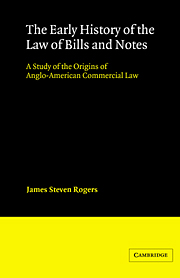 The Early History of the Law of Bills and Notes
The Early History of the Law of Bills and Notes Book contents
- Frontmatter
- Contents
- Preface
- Table of cases and precedents
- Note on citation
- Introduction
- 1 The central courts, commercial law, and the law merchant
- 2 Early exchange transactions: commercial practice
- 3 Early exchange transactions: private law
- 4 Early exchange transactions: public law and policy
- 5 From exchange transactions to bills of exchange: the transformation of commercial practice
- 6 The custom of merchants and the development of the law of bills
- 7 The civilians and the law of bills in the seventeenth century
- 8 Transferability and negotiability
- 9 The law of bills and notes in the eighteenth century
- 10 The problem of accommodation bills
- Conclusion
- Bibliography
- Index
Conclusion
Published online by Cambridge University Press: 22 September 2009
- Frontmatter
- Contents
- Preface
- Table of cases and precedents
- Note on citation
- Introduction
- 1 The central courts, commercial law, and the law merchant
- 2 Early exchange transactions: commercial practice
- 3 Early exchange transactions: private law
- 4 Early exchange transactions: public law and policy
- 5 From exchange transactions to bills of exchange: the transformation of commercial practice
- 6 The custom of merchants and the development of the law of bills
- 7 The civilians and the law of bills in the seventeenth century
- 8 Transferability and negotiability
- 9 The law of bills and notes in the eighteenth century
- 10 The problem of accommodation bills
- Conclusion
- Bibliography
- Index
Summary
Let us reconsider what is really meant by statements to the effect that ‘the Law Merchant, or Lex Mercatoria, is part of the Common Law’. Much of the sense of mystery and jurisprudential complexity that surrounds that notion is probably attributable to nothing more than the odd grammatical construction of the phrase ‘Law Merchant’. In English, when a noun is made into an adjective, a suffix is usually added, and adjectives in English generally precede rather than follow nouns. Moreover, in the twentieth century, we no longer employ such stylistic flourishes as capitalizing nouns, or rendering them into Latin. If these ordinary conventions were followed, we would have the rather unremarkable sounding proposition that ‘mercantile law is part of the common law’, or, to say the same thing in different words, ‘commercial law is part of English law’.
The proposition that ‘commercial law is part of English law’ is, however, not really as pedestrian as it may first seem. In chapter 1, it was shown that even in medieval times the common law courts regularly heard cases arising out of commercial transactions. On the other hand, it seems apparent that a medieval English lawyer would not have thought of describing these as commercial law cases, but as actions in account, debt, or whatever. That a case arose out of a commercial transaction was not a legally interesting point; that it raised an issue about resummons was.
- Type
- Chapter
- Information
- The Early History of the Law of Bills and NotesA Study of the Origins of Anglo-American Commercial Law, pp. 250 - 252Publisher: Cambridge University PressPrint publication year: 1995
